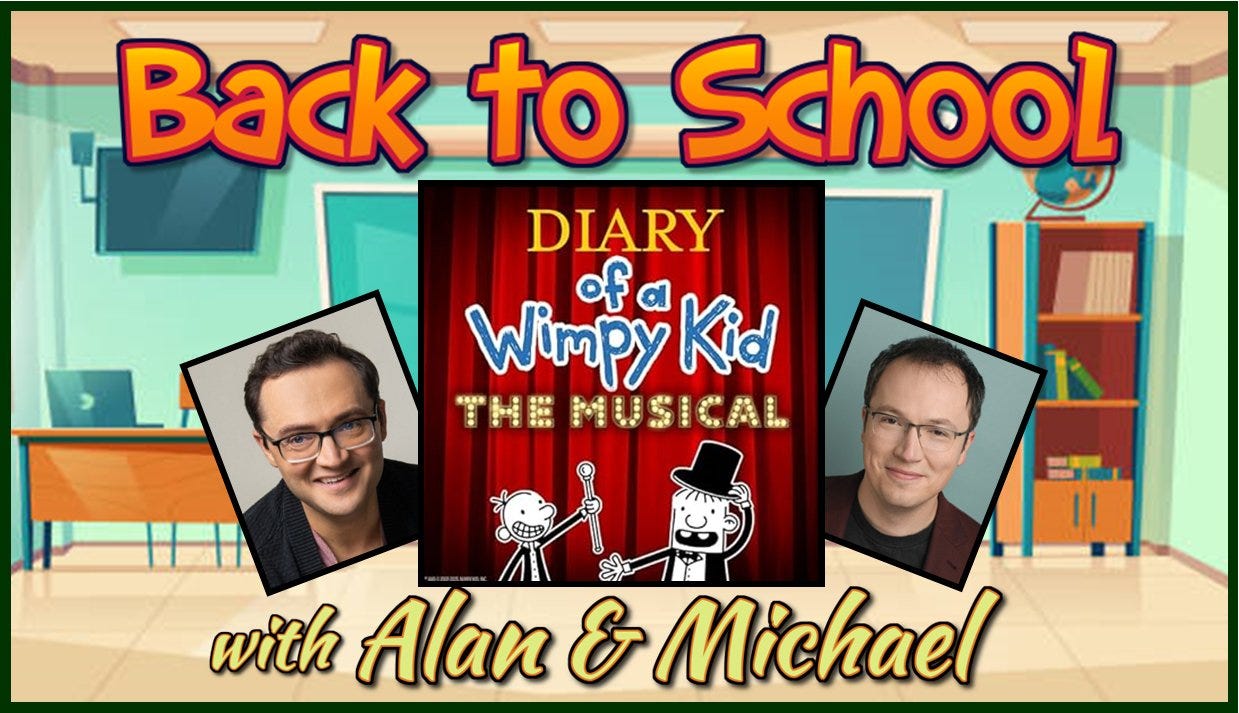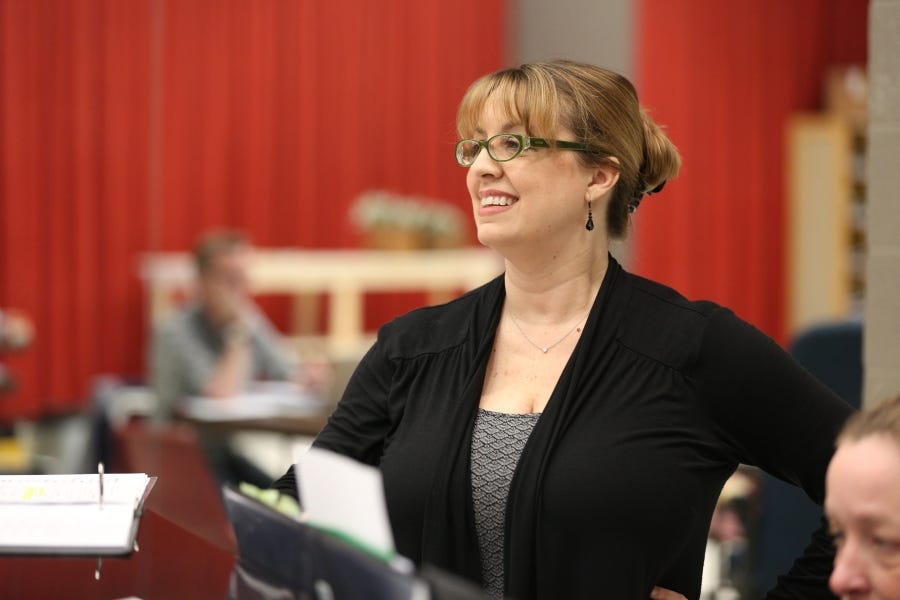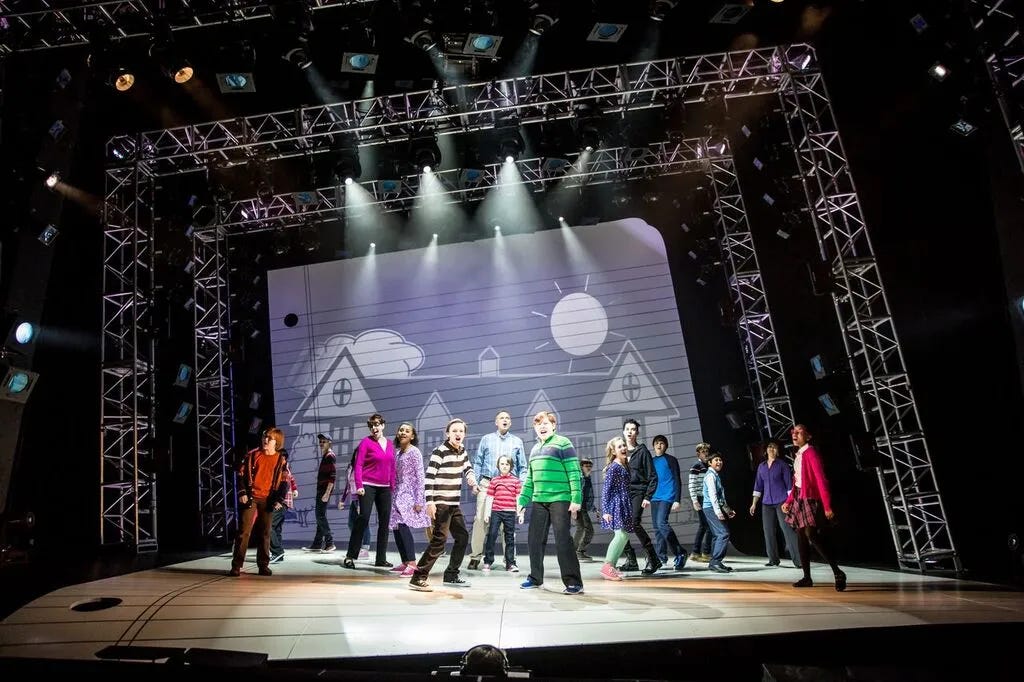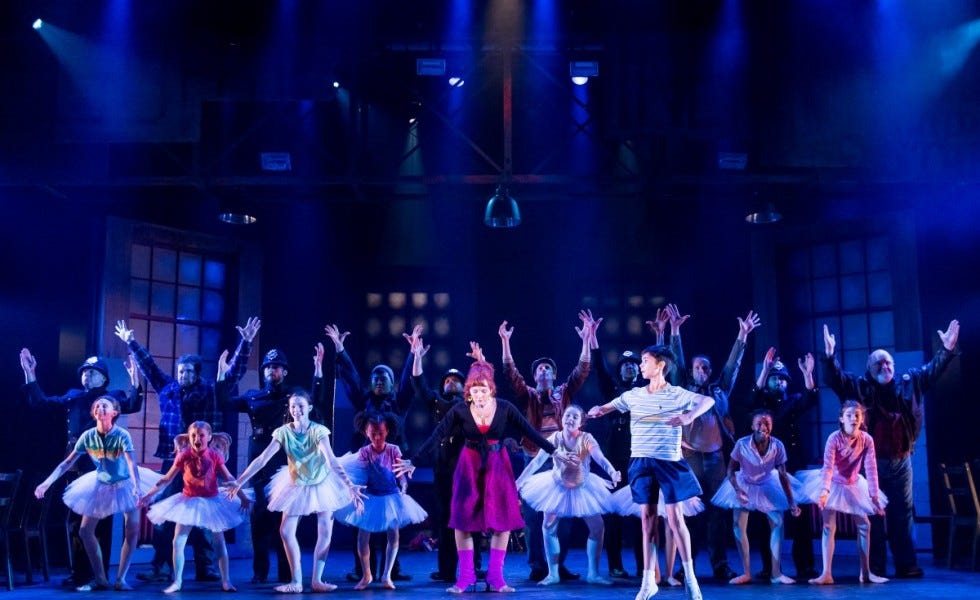DIARY OF A WIMPY KID WEEK: ALAN SCHMUCKLER AND MICHAEL MAHLER (Part 1)
How do you take a much-beloved series of 25 books, 7 movies, and a video game and turn them into a two-hour musical?
Composers and lyricists Alan Schmuckler and Michael Mahler have kind of done it all. They met in Chicago at Northwestern, and for more than a decade worked both together and alone on shows in Chicago, winning awards and a lot of praise.
Mahler still lives in Chicago, where he works as an actor, music director and composer/lyricist, while Schmuckler now lives on the East Coast. But they continue to work together and also delight in each other, as I discovered earlier this spring when I interviewed them by phone about doing the music and lyrics for Diary of a Wimpy Kid.
Our conversation roamed widely, from the development of the show to a deep dive into one song and more general thoughts about writing shows for and about children, which both have done throughout their careers. And so I’ve split our conversation into three parts, one on each topic.
Today you’ll hear about how they first came to the show. A big part of that conversation ends up being about Rachel Rockwell, the talented and beloved Chicago actress and director who was the show’s guiding light in its first iteration. As book writer Kevin del Aguila mentioned yesterday, Rachel was diagnosed with cancer during the show’s development, and after a period in remission died of cancer as the show was being rewritten and prepared for a second mounting.
Rachel is clearly a major part of why the show is the success that it is, and I’m glad we were able to talk about her as much as we did.
Diary of a Wimpy Kid is such a massive series, 18 books so far plus adaptations. And your cast is pretty sprawling. What went into deciding who and what to include?
Alan Schmuckler: When we got the job, Mike and Kevin del Aguila and I were told Hey, check out the first couple books. We were not like, marching-ordered into what to adapt, but we were certainly at the time, as neophytes to the canon, pointed in the right direction.
And I think it became clear to the three of us who the main characters were in Jeff Kinney’s world—Greg and his family and his closest friends and the teacher characters. We also watched the first movie or two, because there have been a bunch of adaptations in a bunch of different mediums.
Michael Mahler: Even since we started there have been new movies and adaptions.
AS: So yeah, I think we drove toward the center and found a world that was right for adaptation.
MM: And I think working with Kevin, it came down to making sure that we were telling a cohesive story. The book is written to be so episodic, little funny comic happenings throughout Greg’s year. In adapting it into a musical we wanted to give it as much of a throughline all the way through as we could.
So that kind of became our guiding star: What do we need to include, and how do we structure this story in a way that has a beginning and a middle and an end that feels satisfying on stage.
I know you’re both composers and lyricists. In terms of this show, how did that process work?
AS: Mike and I have been writing together for more than 20 years at this point. And broadly speaking we’ve spent about half of that time living down the street from each other, and half living a quarter of a country away from each other. Which is to say, through our professional lives together, we’ve come up with a number of very different ways of collaborating, all towards the goal of, you know, Mike and Alan wrote a song, here it is.
When we started Wimpy Kid, I had moved not long before from Chicago back home to the East Coast where I’m from originally. So when we first started writing it, we tried Hey, why don’t you try writing this song, why don’t I try writing that song. And there’s probably still some traces of that work in the score. But not a lot: Developing this show [became like] what usually happens to the two of us. Songs tend to be built when the two of us are working together, and not putting lyric on top of music or music on top of lyric, but idea on top of idea. Most of the time it’s the two of us starting with no song and then both kind of putzing around until there is a song.
MM: I think that even the stuff in the show that exists now and started as one of our ideas, we both got our grubby little hands on. And a lot of our favorite stuff we came up together nose to nose. I remember we came up with "Stuck in the Middle" when we were in a work session at Chicago Theater and we were supposed to be working on something else.
We ran off into a corner, grabbed a piano and wrote "Stuck in the Middle."
AS: That’s right.
MM: Or we wrote “Animal Heart” in a two-hour panic before rehearsal started for the first workshop, because we needed something and we knew the cast was coming in. So we just sat at the piano that morning and we were like, What if it’s this?
That song has remained the show basically unchanged since that like, panicked puke sesh in Minneapolis. *laughs*
That’s wild.
AS: By the way, that “Animal Heart” story is also a real credit to Rachel Rockwell [director of the original production at Minneapolis’s Children’s Theatre Company].
We could spend the whole conversation talking about Rachel. We were hired to write the show originally with very very little lead time up to the first production. So Mike and I and Kevin were really scrambling to get a a draft together that a cast could read. And I remember coming to that workshop without this song written for the “Animal Heart” spot, and I remember thinking to myself, It’s a first workshop. Surely we can say Hey everyone there’s going to be a fun song here, etcetera etcetera. And we felt that out with Rachel, and Rachel, in her very Rachel kind-but-firm manner, made it clear that that would not fly, that there must be a song there.
*Mike laughs*
AS: And because of the depth of our admiration for her and our respect for her, once she made it clear to us that that would not fly, the only option available to us was the aforementioned puke session. We really couldn’t let Rachel down. She was setting the bar for us and we had to rise to it. So we panicked and wrote “Animal Heart”.
Was Rachel involved from the very beginning?
MM: Oh yeah, she was the one who brought us on board. She had a relationship with the producer Kevin McCollum and they were working with Minneapolis’s Children’s Theatre Company to bring Wimpy Kid to life. I believe there was another team that was slated to write the book and lyrics and music that didn’t work out, so Rachel said I know these two guys, y’all should meet them. And it was kind of a quick arranged marriage, because we’d never met Kevin before. Rachel brought us all together at a coffee around a breakfast restaurant in Oak Park, Ill. and sort of laid out the trajectory.
We were so excited to work with Rachel, to work at the theater, to work on this property. Yeah she was sort of the founder of the feast of it all.
And how did you know her originally? Or, how did she know you?
MM: Oh God, Rachel was one of the first persons who hired me to work as an actor in Chicago. I think Alan the same. We did children’s theater with her, and we got to be sort of be there on the ground floor as she became the force of nature director that she became. She directed the first show you ever wrote, right Alan?
AS: Yeah, Rachel got me my Equity card when I was still acting. She directed the first musical I ever wrote my own solo music and words to. Rachel was one of the first maybe two or three people in the industry who pointed to me and to Mike and pointed to our work as separate artists and our work as a team and said I trust those guys; I want to work with those guys. I cannot overstate how responsible she is for any success Mike and I have in our lives today.
Wow. I understand why you say we could just talk about her.
AS: I miss her every day. And the hole she has left these many years after she’s passed remains really, really large.
There’s some great interviews with Rachel online. This one, in which we talks about directing The Sound of Music, has great some insights into how she thinks about telling stories that involve children.
Was children’s theater always her thing?
AS: No. In Chicago theater, where Mike is still a shining star, and where I spent my 20s and Rachel started, children’s theater is very much a gateway drug. A lot of actors get their Equity card doing children’s theater. The first show Mike and I ever wrote as a team (he was 22, I was 21) was a children’s theater show. I think a couple of Rachel’s first moments of traction as a director/choreographer were in Chicago doing children’s theater. She’d been an actor; I think she was in the Ragtime national tour.
MM: I think so. She’d done a million things in Chicago, too. She was sort of all over the place. It was her doorway into the directing/choreographing world in that city. This was quite a few years ago, and it still is a boys’ club but it certainly was then, and she had to blaze her own trail.
But she took it seriously. A lot of the material she was given to work on early on wasn’t necessarily great, and she always brought her A game and treated it like theater, not like something lesser, not Oh well this is just something for the kids. She always wanted it to be really good.
Doing work that was inclusive of children, I think that was part of her mission, in addition to directing incredible adult pieces like Ride the Cyclone or the production of Ragtime that she did in Chicago that was such a huge success.
AS: Oh god that was so good. Her Ragtime was so good.
A scene from Rachel’s production of Ragtime.
MM: It was amazing. They literally expanded Drury Lane Oakbrook Theatre to fit her production.
All of which is to say, I don’t think she ever treated the two kinds of theater differently. It was like, This is theater and we’re going to do it really well, and we’re going to respect our audience and we’re going to improve the material and work with good people.
Probably my biggest surprise in seeing the show was that it was filled with middle school kids, it’s adapted from a children’s book series, but it does not all feel in tone or challenge for the actors like a children’s theater show. It’s very much punching up, not punching down. (I’m not sure if that’s the right metaphor?)
MM: Yeah, that was all Rachel. And we knew going into it, and Rachel knew too, that we would sort of have to build a Greg. She had just done an amazing job of Billy Elliot and it was the same thing: You find a kid and you know they can do it and then you sort of build them up to it. You like, walk them up the mountain.
She was so good at that. She was so good at working with young actors and as you said, not punching down, not expecting any less of them just because they were young. She set really high bars and helped them to jump over them. It was cool to watch.
The Chicago Tribune described Rachel’s 2015 production of Billy Elliot at Drury Lane (above) as one Chicago finally “could call its own, a fresh, original, intimate staging reflecting the city’s signature deep emotional connection, its understanding of gruff, blue-collar men who still know how to cry, its love of neighborhood community.”
It would go to win Jeff awards both for Rockwell’s choreography and lead actor Nicholas Dantes’ performance, which Tribune writer Chris Jones said “has an implicit sadness that none of the others [that he had seen in New York, London, and the Broadway touring company] so well conveyed. All he does seems to flow from and through his pain.”
In developing the show, then, was it always the goal to cast kids at the characters’ ages?
MM: Yeah, she always had that very clear in her head. It even affected how we wrote the score, because if you’re writing for high school kids, then all the boys’ voices would have changed. And she was like No, we want to have unchanged boy voices, and I think she's right. It really speaks to that weird, particular moment in a human’s development where they’re right on the cusp of GIRLS or BOYS or whatever, and like, not quite all the way there but knocking at the door.
Something about having that unchanged purity in the voice of the lead characters does all of that work for you without having to spend scenes and scenes talking about it. It was really I think a masterstroke.
Tomorrow, we talk about the rewrite of Wimpy Kid and second production in 2022, and dive deep into the writing of one of its new tunes, “The Fregley Song.”






